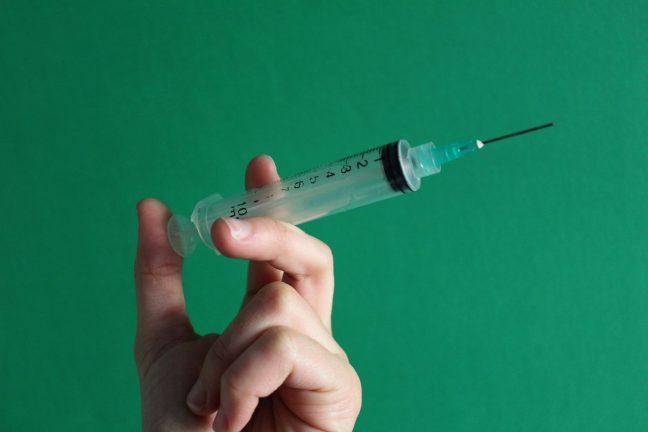Public health is challenged by political ideology guiding individual decision making in the pandemic rather than science, University of Wisconsin epidemiologist Malia Jones said.
Jones said Wisconsin faces an unprecedented crisis as a consequence of COVID-19. Spread rates have risen to the point of overextending the resources necessary to provide care. This resource gap could lead to even more deaths in high-risk populations.
“We are quickly approaching a critical threshold where we will run out of hospital support for people who are sick,” Jones said. “When that happens, we’re really going to be in dire straits.”
UW research provides alternative approach to flu, COVID-19 vaccine development
In order to support those who require health care, hospitals need space, supplies and staff. These supplies are running out as COVID-19 cases and spread rates are increasing, Jones said. If these resources run out, hospitals will have to implement triage care, a system of prioritization that would turn some away who need non-COVID-19 related care.
The best method to combat the spread of COVID-19 is physical distancing and face coverings, Jones said. Jones said since these safety measures have become politicized, far too many Wisconsinites are ignoring recommended precautions, which poses a threat to public health until a vaccine is approved.
“Instead of science leading on what we need to be doing in order to control the pandemic, we have a situation where political ideology is leading,” Jones said. “It leads people to make choices that aren’t helpful at all in terms of controlling the pandemic.”
Jones is the Editor in Chief of a social media campaign called Dear Pandemic. This campaign consists of 14 interdisciplinary female experts who organize and deliver pandemic information to the public via Facebook, Twitter and Instagram, Jones said.
Dear Pandemic curates a broad range of pandemic-related information including details regarding herd immunity, masks and, lately, vaccine updates. Dear Pandemic aims to be a nonpartisan medium for delivering information to the public, Jones said.
“It’s been a real challenge to do public health in the context of the national election and the whole public health crisis being highly politicized,” Jones said. “What we don’t need is politics on either side of the aisle jumping in.”
Jones said a vaccine may be approved in the coming weeks, after which it will be distributed to certain demographics in prioritized tiers. This vaccine will take time to reach the public, as it may not be available to the general population until the spring, Jones said.
Life Science Communications professor Nan Li said vaccination is one of the clearest avenues for a return to normalcy, but there will be challenges in fairly distributing the vaccine to those that need it. There have been a few systems proposed for the distribution of vaccines.
“I think that vaccination is definitely something that will show promising outcomes, but on the other hand I think it’s going to be challenging and I think we may see some drama coming out from the whole distribution process,” Li said.
According to Li, the first group to receive vaccinations should be medical personnel and essential workers, then it should go to elderly and high-risk populations, especially those in group living.
Following medical staff and frontline workers, Li said experts disagree on who should receive a vaccine next, as some propose distributing the vaccine by industry and others propose distributing it to minorities or other high-risk groups first.
As the vaccine reaches the public, Li said the government should stress the importance and fairness of this process by highlighting the vaccine’s positive outcomes.
“There are so many different parts involved in this — I think it’s really the government’s job to explain why we are doing things in a certain way,” Li said. “It’s not going to satisfy everybody at the same time, but they should explain why this is fair and why you should accept it.”
Two of the current vaccine candidates are a new type of vaccine known as an mRNA vaccine, Jones said. An mRNA vaccine introduces genetic material, rather than a dead or inactive form of the virus, to cells in the body to prime an immune system response.
Jones said because an mRNA vaccine isn’t a dead form of the virus, it is much more efficient in production, as labs can produce this molecule rather than growing a weakened or dead version of the virus, which takes time.
mRNA vaccines must be stored in extremely low temperatures and not all facilities will be able to store them, Jones said. This means some people may have to travel to certain facilities to receive the vaccination.
UW announces new COVID-19 vaccine research, $1.5 million in grants
The data reported from clinical trials show mRNA vaccines are generally safe, and as more details emerge, the scientists should release information on any sort of side effects and the safety data, Jones said.
“I think helping people understand how an mRNA vaccine works and what it can and cannot do is going to be really important in getting some people to overcome their fears about how safe the vaccine is,” Jones said.
Jones said even after a vaccine is approved for COVID-19, social distancing and the use of face coverings must continue until the majority of the country becomes vaccinated.
Li said there is a political divide in combating COVID-19 compounded by a generational gap, as younger people tend to care less about COVID-19 safety measures because they, in general, are at a lower risk of suffering from the virus’ severe health effects. The younger generation must still consider the importance of both vaccination in conjunction with health and safety guidelines as more Americans are vaccinated, Li said.
“Really, we shouldn’t be spending time with anyone outside our own households in an indoor setting,” Jones said. “It’s hard to overstate how horrible [COVID-19] really is.”


















